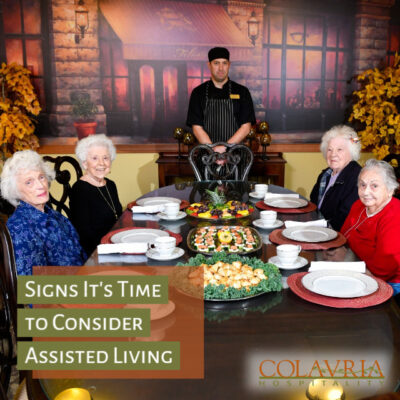 The transition from independent living to assisted living can be a difficult one to make. Whether you are making this decision for yourself or for a loved one, it is important to carefully evaluate several factors. What are the signs that it’s time to make the switch?
The transition from independent living to assisted living can be a difficult one to make. Whether you are making this decision for yourself or for a loved one, it is important to carefully evaluate several factors. What are the signs that it’s time to make the switch?
When Should You Consider Assisted Living?
Because of the emotions that come with major life transitions, it is important to view the situation objectively. The need for assisted living becomes increasingly necessary as the following signs begin to occur in you or your loved one.
1. It becomes difficult to complete basic chores or tasks.
Common daily tasks, such as paying bills, sweeping the floor, washing dishes, watering plants, etc. become far more difficult when it is time to make a transition. In some cases, getting in-house help can solve these minor problems. However, if more chores start popping up on the “cannot do” list, consider a senior community for yourself or your loved one.
2. Minor injuries occur on a regular basis.
Another common sign that it might be time to move is the sudden appearance of minor injuries. Cuts, bruises, falls, etc. might be small issues now, but in time, they could become more serious. Moving into a senior community before small injuries turn large is an important part of prioritizing your health.
3. You feel lonely or isolated from the world.
Loneliness plays a huge role in life’s transitions. If a spouse has recently passed away, or family and friends live across the country, it is important not to remain isolated. Loneliness often turns to depression. It is far better to curb it by moving into a vibrant, healthy community.
4. Personal hygiene begins to feel like an overwhelming task.
Among daily tasks that should be done is personal hygiene. If you or your loved one has difficulty brushing teeth, washing hair, standing in the shower, getting dressed, etc., it is important to get help.
5. You experience weight loss or difficulty eating.
Rapid weight loss or loss of appetite indicates deeper health problems. First, schedule a visit to the doctor. If the loss of health has more to do with difficulty getting around than with a bodily function, consider making the transition.
6. It is hard for you to get around your home.
Finally, it is time to consider assisted living when moving around the home becomes difficult. Particularly if you or your loved one lives in a multi-story building, getting around becomes an impossible task.
Help Ease the Transition
Whether you are making the transition yourself or helping a loved one with it, remember that it’s okay to make the transition as easy as possible. In fact, you can make things easier by applying the following tips.
Thoroughly research the facility and staff.
The team members mean everything. If you find a facility with a team you love, that just might be the one. Remember, people are just as important as facilities.
Communicate openly about it with loved ones.
Seek advice and counsel from family, friends, and doctors. Ask plenty of questions, especially when researching facilities. Communication is key during this transition, so don’t turn it off.
Don’t put it off.
The longer you wait, the harder it is. It is usually best to make this life change just before you or your loved one need it, as it prevents health problems and other difficult moments from occurring.
How Can Colavria Hospitality Help?
Colavria Hospitality is a local, family-owned company specializing in assisted living, rehabilitation, and long-term care in the greater Denver area. If you are looking for a wonderful senior community or are interested in joining our team, call us today.
 The transition from independent living to assisted living can be a difficult one to make. Whether you are making this decision for yourself or for a loved one, it is important to carefully evaluate several factors. What are the signs that it’s time to make the switch?
The transition from independent living to assisted living can be a difficult one to make. Whether you are making this decision for yourself or for a loved one, it is important to carefully evaluate several factors. What are the signs that it’s time to make the switch?